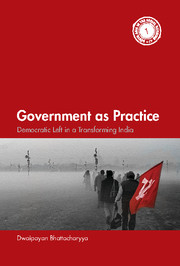Book contents
1 - Inception: Government as Practice
Published online by Cambridge University Press: 05 March 2016
Summary
Parliamentary left parties in India never had it so bad before. In the national election of 2014, they won barely 12 seats, down from 60 odd seats they got 10 years ago, when their support proved crucial to form the Congress-led United Progressive Alliance government in New Delhi. By contrast, the left is now voted out of relevance in national politics. It is virtually wiped out in its bastion – West Bengal – where the tally came down sharply from 35 to merely 2 seats. Over the first decade of the twenty-first century, some 20 years or so after the collapse of the Soviet Union, the mainstream left slid from its historic high to an all-time low in the country's electoral battlefield. This dramatic debacle also coincides with an unprecedented rise of rightwing forces clustering around a party of religious and market fundamentalism. The question is: can India's democratic left ever hope to retrieve, and how?
An attempt to answer this cannot but move through West Bengal – an eastern Indian state with a population of 90 million – where an alliance of communist and socialist parties, the Left Front, ran a government for 34 years, from 1977 to 2011. It had been an exceptional feat for a government to win elections without a break for so long in the slippery domain that is Indian politics. Few such cases of continuity perhaps exist in the democratic world. Barring the troubling last half decade, the alliance maintained its superiority in every local, regional or national election by garnering almost half of popular votes and an overwhelming number of constituencies. Just when the regime seemed ‘invincible’ after a resounding triumph in 2006 election, its popular support started to wane. In 2011, the Left Front government met with its first definitive defeat. The left's rare continuity and dramatic collapse – this book argues – can be traced to the dynamics of its administrative and strategic priorities as a governmental force in West Bengal. In this chapter we travel through some major turns in its long journey over some seven decades and ask how the democratic left can think afresh beyond its restricted social, ideological and regional appeal, and hope to contribute meaningfully to the evolving ideational and public policy debates in a rapidly transforming India.
- Type
- Chapter
- Information
- Government as PracticeDemocratic Left in a Transforming India, pp. 1 - 55Publisher: Cambridge University PressPrint publication year: 2016



